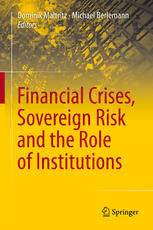
Financial Crises, Sovereign Risk and the Role of Institutions PDF
Preview Financial Crises, Sovereign Risk and the Role of Institutions
Dominik Maltritz · Michael Berlemann Editors Financial Crises, Sovereign Risk and the Role of Institutions Financial Crises, Sovereign Risk and the Role of Institutions ThiSisaFMBlankPage Dominik Maltritz (cid:129) Michael Berlemann Editors Financial Crises, Sovereign Risk and the Role of Institutions Editors DominikMaltritz MichaelBerlemann FacultyofEconomics, FacultyofEconomicsandSocialScience LawandSocialSciences Helmut-Schmidt-UniversityHamburg UniversityofErfurt Hamburg,Germany Erfurt,Germany ISBN978-3-319-03103-3 ISBN978-3-319-03104-0(eBook) DOI10.1007/978-3-319-03104-0 SpringerChamHeidelbergNewYorkDordrechtLondon LibraryofCongressControlNumber:2013957807 #SpringerInternationalPublishingSwitzerland2013 Thisworkissubjecttocopyright.AllrightsarereservedbythePublisher,whetherthewholeorpart of the material is concerned, specifically the rights of translation, reprinting, reuse of illustrations, recitation,broadcasting,reproductiononmicrofilmsorinanyotherphysicalway,andtransmissionor informationstorageandretrieval,electronicadaptation,computersoftware,orbysimilarordissimilar methodologynowknownorhereafterdeveloped.Exemptedfromthislegalreservationarebriefexcerpts inconnectionwithreviewsorscholarlyanalysisormaterialsuppliedspecificallyforthepurposeofbeing enteredandexecutedonacomputersystem,forexclusiveusebythepurchaserofthework.Duplication ofthispublicationorpartsthereofispermittedonlyundertheprovisionsoftheCopyrightLawofthe Publisher’s location, in its current version, and permission for use must always be obtained from Springer.PermissionsforusemaybeobtainedthroughRightsLinkattheCopyrightClearanceCenter. ViolationsareliabletoprosecutionundertherespectiveCopyrightLaw. The use of general descriptive names, registered names, trademarks, service marks, etc. in this publicationdoesnotimply,evenintheabsenceofaspecificstatement,thatsuchnamesareexempt fromtherelevantprotectivelawsandregulationsandthereforefreeforgeneraluse. While the advice and information in this book are believed to be true and accurate at the date of publication,neithertheauthorsnortheeditorsnorthepublishercanacceptanylegalresponsibilityfor anyerrorsoromissionsthatmaybemade.Thepublishermakesnowarranty,expressorimplied,with respecttothematerialcontainedherein. Printedonacid-freepaper SpringerispartofSpringerScience+BusinessMedia(www.springer.com) In honor of our esteemed teacher, colleague and friend Alexander Karmann ThiSisaFMBlankPage Preface According to Wikipedia, a Festschrift “is a book honoring a respected person, especially an academic, and presented during his or her lifetime.” Since we have edited this book to honor Alexander Karmann, our highly respected academic teacher,ontheoccasionofhis 65thbirthdaythisbook,entitled“Financial Crises, SovereignRiskandtheRoleofInstitutions”,isobviouslyaFestschrift. Alexander Karmann was born on the 19th July 1948 in Nuremberg. He started studyingmathematicsatUniversityofErlangen-Nurembergin1967.Moreoverhe studied music at the Academy of Music Nuremberg. After passing his exam as a concertpianisthereceivedhisdiplomainmathematicsin1975.Hethenswitchedto Karlsruhe University, where he received his Ph.D. for a dissertation with the title “Competitiveequilibriainspatialeconomies”undertheadviceofProf.Dr.Rudolf Henn in 1979. Only 4 years later, he received a venia legendi for economics and statistics at Karlsruhe University after completing his habilitation with a work on MiltonFriedman’sPermanentIncomeHypothesis.In1986heacceptedanofferof Hamburg University for a professorship in economics. Since 1994 he has been professorofeconomics,especiallymonetaryeconomics,atTechnicalUniversityof Dresden. Alexanderstartedpublishingininternationalpeer-reviewedjournalslongbefore themajorpartoftheGermancommunityofeconomistsrecognizedthenecessityto takepartintheinternationaldiscussion.Asaconsequencehehaspublishedarticles inmanyinternational,highlyreputedjournalssuchastheJournalofMathematical Economics, Regional Science & Urban Economics, the Journal of Institutional & TheoreticalEconomics,theEuropeanJournalofHealthEconomics,theReviewof Development Economics, the Journal of Banking & Finance or the Review of International Economics, to name only a few. Different from most contemporary young economists he has worked on a wide variety of fields, including regional economics,theshadoweconomy,monetarypolicy,bankingandfinancialmarkets, financial crises and health economics. He also edited a number of highly relevant contributed volumes. Last but not least he published a textbook on mathematical methodswhichinthemeantimeisavailableinthe6thedition. Throughout his professional career Alexander has held numerous positions in economicorganizations.HehasbeenmemberoftheDirectorateoftheVereinfu¨r vii viii Preface SocialpolitikandisactivememberofthreeofitsResearchCommittees(Industrial Economics, Environmental and Resource Economics, Health Economics). More- overheisResearchProfessoratHalleInstituteforEconomicResearch/IWH.Asof today, Alexander is Director of the Centre for Health Economics at Technical UniversityofDresdenandChairmanoftheDirectorateoftheGermanAssociation of Faculties of Economic and Social Sciences (WISOFT e.V.). However, he was and still is not only active in external economic organizations. Alexander also servedhisFacultyfor5yearsasDean. Finallyandforthetwoofussurelymostimportant,Alexanderdidamarvelous job in supporting young academics in their research. Numerous Ph.D. candidates successfullyfinishedtheirprojectsunderhisadviceandnowworkinorganizations around the globe. Three of his former staff members hold professorships at Universitiesanditseemsrealisticthatthisnumberfurtherincreasesinthefuture. All these merits are more than enough to be honored with a Festschrift. How- ever, the primary reason for us to organize this Festschrift is that both of us feel deeplyindebtedforthegreatsupporthegavetous. When we planned this Festschrift we were well aware of the fact that Festschriftenoftenincludealargenumberofarticlesonquiteheterogeneoustopics which stand – if at all – only in loose connection. In the light of the fact that Alexander was active on so many different fields we decided to refrain from producingamerecollectionofarticlesfromdifferentfieldsofeconomics.Instead, we opted for editing a book on one topic which has been in the centre of Alexander’s interest throughout the last years: Financial Crises and Sovereign Defaults. We are happy that besides a number of Alexander’s scholars also some colleagues which are experts in the field and which are in close connection with Alexanderagreedtocontributetothisvolume.Wewouldliketousetheopportunity tothankallcontributorsfortheirfantasticcooperationinthisproject. Interestingly enough, Wikipedia cites on its internet page on Festschriften also Endel Tulving, a Canadian neuroscientist, when writing: “a Festschrift frequently enough also serves as a convenient place in which those who are invited to contribute find a permanent resting place for their otherwise unpublishable or at least difficult-to-publish papers.” We hope you, Alexander, as well as the other readersofthisbookwillagreethatthisFestschriftisanexceptioninthisrespect. HamburgandErfurt,Germany MichaelBerlemann July2013 DominikMaltritz Contents Introduction . . . . . . . . . . . . . . . . . . . . . . . . . . . . . . . . . . . . . . . . . . . . . 1 MichaelBerlemannandDominikMaltritz Gold-BackedSovereignBonds:AnEffectiveAlternativetoOMTs . . . . . 7 AnsgarBelke TrustintheEuropeanCentralBankThroughouttheWorldwide FinancialCrisisandtheEuropeanDebtCrisis . . . . . . . . . . . . . . . . . . . 25 MichaelBerlemann SIFIsintheCrossSea:HowAreLargeGermanBanksAdjusting toaRoughEconomicEnvironmentandaNewRegulatorySetting? . . . 49 ThiloLiebigandSebastianWider TheEndogenousFragilityatEuropeanPeriphery . . . . . . . . . . . . . . . . 65 NikolayNenovskyandMomtchilKarpouzanov TheDangerofTaxHavensforFinancialStability . . . . . . . . . . . . . . . . 81 AndreasBuehnandDanielKraaijeveldvanHemert TheEvolutionofInternationalGeo-PoliticalRisk1956–2001 . . . . . . . . 93 EphraimClarkandRaduTunaru FinancialCrisesandSovereignDefault:Dependencies,Timing andUncertaintyinaStochasticFramework . . . . . . . . . . . . . . . . . . . . . 115 DominikMaltritz TheRiskofWithdrawalsfromtheEMUandtheForeign ExchangeMarket . . . . . . . . . . . . . . . . . . . . . . . . . . . . . . . . . . . . . . . . . 141 StefanEichler AnEconomicApproachtoMarketRisk . . . . . . . . . . . . . . . . . . . . . . . . 157 ChristianHott TheQuantityTheoryofMoneyinYearSixAftertheSubprime MortgageCrisis . . . . . . . . . . . . . . . . . . . . . . . . . . . . . . . . . . . . . . . . . . . 169 MichaelGraff ix
